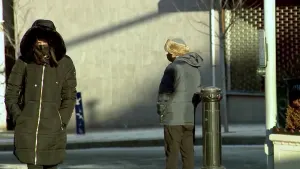More Stories
A Westchester artist is
forging her community's history in bronze.
With every detail and model,
Yonkers artist Vinnie Bagwell is re-molding the story of her people.
You may not recognize
Bagwell but maybe you know her work:
“The Breadth of Slavery" at the Yonkers Public Library.
Sojourner Truth in Poughkeepsie
and Frederick Douglass at Hofstra are just
a few of her works on display. "I didn't think that doing this kind of work would connect me
literally to history," says Bagwell.
Born in Yonkers in the late
50s, Bagwell was always good at drawing. "My parents would brag about
me."
But after a variety of jobs,
she was looking for her place. At 36, in 1993, she tried sculpting for fun. "Four days later, I come up
with my first sculpture and I freak out."
But there were challenges, such as how to make money in an expensive, white male-dominated
medium. She found public art grants and asked for her first commission from
Yonkers in 1996 - a life-sized bronze first lady of jazz, Ella Fitzgerald. It
was the first-ever sculpture a U.S. municipality-commissioned of a contemporary
African-American woman.
Bagwell’s success is even more amazing
since she's legally blind. "I was one of the first children to wear hard
contact lenses."
Bagwell says she sees public art as a form of reparation, and she carves humanity into every enslaved statue along with lessons. "How long can I engage you with the work? Can I make you walk all the way around it?"
Bagwell says she sees public art as a form of reparation, and she carves humanity into every enslaved statue along with lessons. "How long can I engage you with the work? Can I make you walk all the way around it?"
For more than a decade, Bagwell has also been
working on the "Enslaved Africans' Rain Garden,” a Yonkers sculpture
garden honoring the first enslaved Africans freed by law in the country. That's set to open this spring.
She says the last few years,
her phone has been ringing.
She says it's exciting to
hear about commissions like a new $4 million competition from Dayton College to
honor enslaved Africans. "It's kinda like when the Lotto gets to be $900
million, you just take all the restrictions off your imagination and you just
think about stuff you want to do."
At 64 years old, Bagwell’s not done yet because she says that while
we're all American, we're not all treated like Americans.
More from News 12
1:31

What's Cooking: Uncle Giuseppe's Marketplace's prime rib roast
1:27

What's Cooking: Uncle Giuseppe's quiche lorraine
2:34

Guide: Safety tips to help prevent home burglaries
0:48

How to protect yourself against frostbite during arctic chill
2:19

Guide: Safety measures to help prevent fires and how to escape one
2:07
